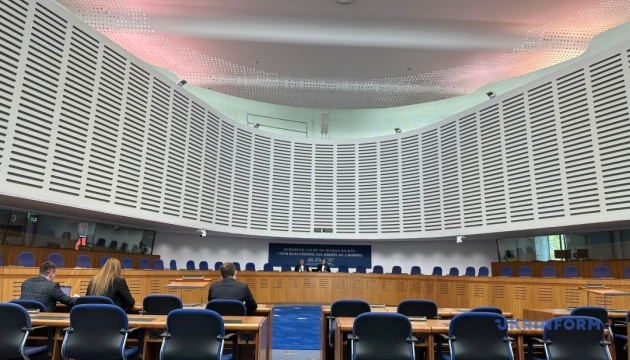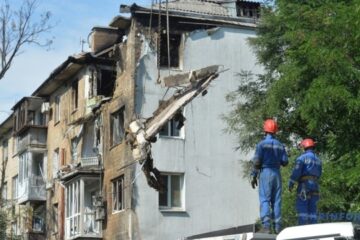
Since 2014, Ukrainian citizens affected by Russia’s crimes on Ukrainian territory have submitted nearly 7,000 individual applications to the European Court of Human Rights.
This was reported by Margarita Sokorenko, Ukraine’s Commissioner for the European Court of Human Rights, during a briefing following the announcement of the ECHR’s judgment in the case of Ukraine and the Netherlands v. Russia, Ukrinform’s correspondent reports.
“This judgment is of particular significance for the next steps available to our citizens who have suffered from the actions of the aggressor state. The decision (issued on 9 July 2025) is especially helpful for those individuals who lodged applications with the Court before 16 September 2022. Since 2014, the Court has received an exceptionally large number of individual applications from Ukrainian citizens. As of today, there are approximately 7,000 pending cases. To ensure a more comprehensive consideration of these applications, the ECHR previously decided to temporarily suspend its examination. This procedural step was intended to allow the Court to first deliver a judgment in the interstate case. Following this judgment (of 9 July), the ECHR will now begin reviewing the individual applications from Ukrainian citizens that had been held in abeyance,” Sokorenko stated.
Video: Ministry of Justice of Ukraine
Sokorenko also recalled that on 16 September 2022, Russia formally ceased to be a Party to the European Convention on Human Rights and was expelled from the Council of Europe. As a result, the ECHR has lost jurisdiction over Russia.
“Can Ukrainian citizens who suffered from Russia’s actions still submit individual applications? Given the procedural decision terminating the applicability of the Convention to Russia, the ECHR cannot and will not accept or consider such applications lodged after 16 September 2022. At the same time, as the President of the Court emphasized, this does not mean that no violations are occurring against our citizens,” she added.
In response to a question on whether the ECHR’s ruling opens greater opportunities for affected individuals to obtain compensation for Russia’s crimes through individual applications, Sokorenko stressed that submitting individual claims solely to the ECHR is no longer meaningful.
“After 16 September, the ECHR is no longer a viable mechanism. While applications can technically still be submitted, the Court no longer has jurisdiction to adjudicate them. Therefore, such filings would not produce the desired outcomes. Other jurisdictions, such as certain UN bodies, may provide avenues for recourse,” she explained.
As reported by Ukrinform, the Grand Chamber of the European Court of Human Rights in Strasbourg has issued its judgment in the inter-State case Ukraine and the Netherlands v. Russia, finding multiple violations of human rights committed by the aggressor state.
This case concerns mass and systematic violations of human rights in the temporarily occupied territories of Donetsk and Luhansk regions, the abduction and attempted unlawful transfer of orphaned children from Donetsk and Luhansk to Russia in 2014, and the downing of Malaysia Airlines flight MH17.
The Ukraine and the Netherlands v. Russia case is the largest interstate case ever considered by the Court, consolidating four applications. It covers events from 2014 to the present and includes violations committed during Russia’s full-scale invasion of Ukraine beginning on 24 February 2022.
A separate part of the proceedings concerns the Netherlands’ application regarding the downing of the Malaysian Boeing, which resulted in the deaths of all 298 people on board. Due to the scale of violations, 26 States and one non-governmental organization joined the case—an unprecedented level of international support in the Court’s history.
Oral hearings in Strasbourg took place on 12 June 2024, during which Ukraine presented its position on events from 2014 and on Russia’s war crimes since the start of the full-scale invasion.
An earlier decision of the Court had already established Russia’s responsibility. On 25 January 2023, in its admissibility decision concerning parts of the case related to events in eastern Ukraine, the Court found that from 11 May 2014 and at least until 26 January 2022, territories in Donetsk Region seized by Russian forces were under the jurisdiction of the Russian Federation.
The Court confirmed that Russian troops had been present in Ukraine since April 2014 and documented the large-scale deployment of Russian forces at least from August 2014. In doing so, the ECHR effectively rejected Moscow’s claims of “no troops” in Ukraine.
The Court also determined that the downing of flight MH17 occurred in an area under the effective control of Russian occupying administrations and thus fell within Russia’s jurisdiction.
Source: Nearly 7,000 applications made to the ECHR by Ukrainians over Russian actions in 11 years



